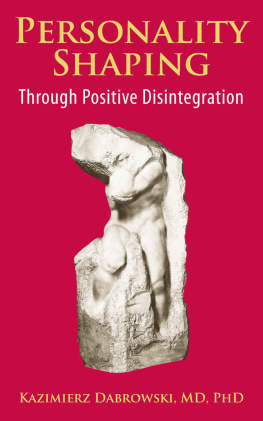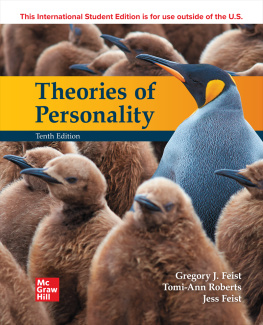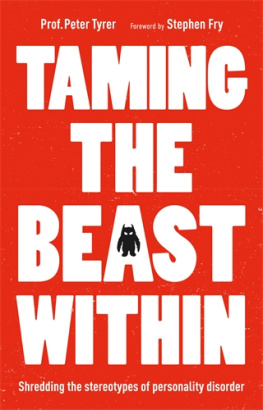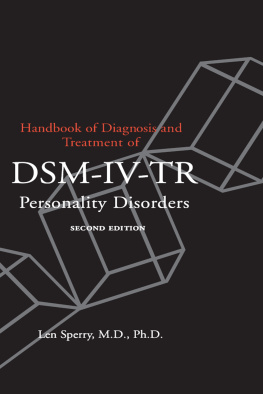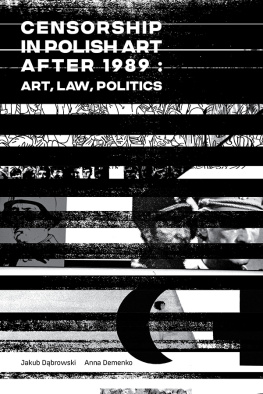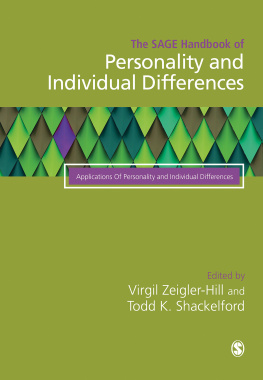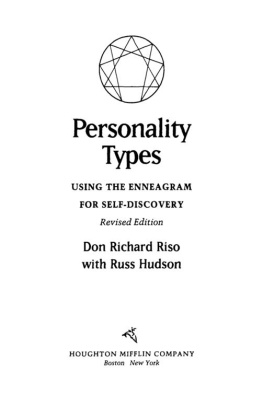For psychologist and psychiatrist Kazimierz Dabrowski, personality is not a given it must be consciously created and developed by the individual. In his second English-language book, Personality-Shaping Through Positive Disintegration, first published in 1967, Dr. Dabrowski presents a comprehensive treatment of personality that is still relevant, perhaps more so today than when it was first written. Here Dabrowski describes personalitys individual and universal characteristics, the methods involved in shaping it, and case studies of famous personalities (including Augustine and Michelangelo) demonstrating the empirical and normative nature of personality development.
Included in this edition are the original introduction, written by former APA president O. Hobart Mowrer, an appendix detailing a study on gifted children and outstanding abilities conducted by Dr. Dabrowski, as well as previously unpublished biographical pieces analyzing the personalities of Beethoven, Kierkegaard, and Unamuno.
Grounded in Dabrowskis theory of positive disintegration, Personality-Shaping introduces the concepts at the heart of the theory and at the heart of human potential, creativity, social service, inner conflict, mental illness, and personal growth. Dabrowskis all-embracing perspective is at once a fresh alternative to the one-dimensional theories and trends pervasive in the field of psychology, and a full statement in its own right of all those aspects of human nature too often marginalized, ignored, or denied a revolutionary and heartfelt product of Dr. Dabrowskis incisive observations and all-embracing vision.
PERSONALITY-SHAPING THROUGH POSITIVE DISINTEGRATION
Kazimierz Dabrowski, M.D., Ph.D.
Introduction by O. Hobart Mowrer, Ph.D.
Red Pill Press
Copyright The Estate of Kazimierz Dabrowski, 2015
All rights reserved
1. Edition, 2015
Red Pill Press (redpillpress.com)
First published in 1967 in the United States by Little, Brown and Co., and in Great Britain by J. & A. Churchill Ltd. No part of this publication may be reproduced, stored in a retrieval system, or transmitted in any form or by any means, electronic, mechanical, or otherwise, other than for fair use, without the written consent of the author.
Table of Contents
PUBLISHERS NOTE
This new edition of Dr. Kazimierz Dabrowskis second English-language book, Personality-Shaping Through Positive Disintegration, has been faithfully reproduced in collaboration with the Estate of Kazimierz Dabrowski based on the original 1967 publication by Little, Brown and Company, Boston. The text has been digitized for joint publication in print and e-book form. It includes the original Introduction, written by Dr. O. Hobart Mowrer (19071982), Research Professor of Psychology at the University of Illinois from 1948 to 1975 and president of the American Psychological Association in 1954. Dr. Mowrer was a great pioneer in his field: he developed integrity therapy, and his ideas have had a great influence on the alcohol and drug rehabilitation field. Like Dabrowski, he recognized the connection between morality and mental health and illness.
This edition also includes three previously unpublished biographical essays written by Dr. Dabrowski on Kierkegaard, Beethoven, and Unamuno, to supplement those given in Chapter 5 (Examples of Historical Personalities). In addition, the Index has been updated with additional names and keywords.
Much of Dr. Dabrowskis professional terminology is no longer common in psychological or psychiatric literature, especially those written for a broad readership; e.g., words like cyclothymia, schizothymia, psychastenia, neurasthenia, etc. In addition, many of Dr. Dabrowskis terms are unique to his theory and not to be found in any common psychology texts (recent or dated). While those terms unique to the Theory of Positive Disintegration are defined in the text, many of the others are not. So, to aid the reader unfamiliar with these terms, we have also included a glossary compiled by Dr. Dabrowski and used in his 1972 book, Psychoneurosis Is Not An Illness.
While the professional terminology may have changed in the intervening years, the unique terms form the skeleton of Dabrowskis theory, and the process of personality-shaping continues, regardless of the terms used to describe it. In fact, the public focus has changed recently through popular books with titles such as Quiet: The Power of Introverts in a World That Cant Stop Talking , The Introvert Advantage: How to Thrive in an Extrovert World , The Highly Sensitive Person , and The Underdog Advantage . If anything this change is in line with the Theory of Positive Disintegration, even if such works do not approach Dabrowskis level of synthesis and comprehensiveness. Unfortunately, other trends go in the opposite direction, with titles like The Wisdom of Psychopaths , making clear the need for a more widespread familiarity with Dabrowski and his works.
The 2015 edition of Personality-Shaping is the first in a project that hopes to see all of Dr. Dabrowskis English works back in print, including three unpublished book manuscripts, and numerous published and unpublished papers.
PREFACE
Personality is not a ready gift but an achievement. This achievement is a very difficult, even painful, process. The aim of this book is to describe and to discuss this process.
Our personality is shaped throughout our lives; our inborn characteristics constitute the basis determining our potential for inner growth. The shaping of personality occurs under the influence of various external milieus. However, it is in the inner psychic milieu that the formative process takes place. The role of the inner psychic milieu is most significant in the accelerated development of psychically richer and more creative individuals.
This means that our personality cannot be created or shaped by some external influence or process without our inner participation. Such involvement is most clearly seen in the development of higher levels of personality. For this to happen we have to have an enhanced awareness, a sense of autonomy and authenticity of our own self.
It will be shown in this work, on the basis of the authors clinical experience and research, that certain psychic elements, such as various forms of overexcitability, germinal elements of the inner milieu, or nuclei of creative abilities, are essential for the formative process leading to the achievement of personality and must come with hereditary endowment. It is usually emphasized that the most important period determining the shaping of personality is the period when the infant tries his own forces against the outer environment. However, one must realize that a period even more important than that of early infancy is the period of awakening that brings about the development of the inner psychic milieu and its main dynamisms.
Conflicts play an extremely important role in the development of personality. Of all types of conflicts the inner conflict is particularly significant. The same can be said about nervousness and psychoneurosis. Without the disturbance and disequilibrium brought about by nervousness and psychoneurosis, the process of personality development cannot be realized. This is because the dynamisms active in these departures from psychic equilibrium also contain the primary elements of creative development.
The authors basic thesis can be stated as follows: Personality development, especially accelerated development, cannot be realized without manifest nervousness and psychoneurosis. It is in this way that such experiences as inner conflict, sadness, anxiety, obsession, depression, and psychic tension all cooperate in the promotion of humanistic development.
Next page
